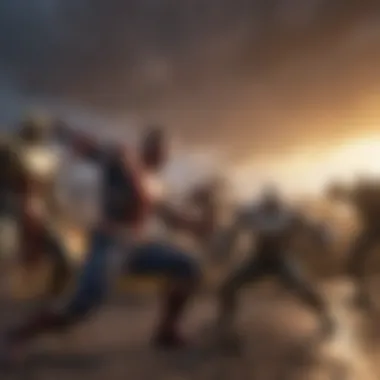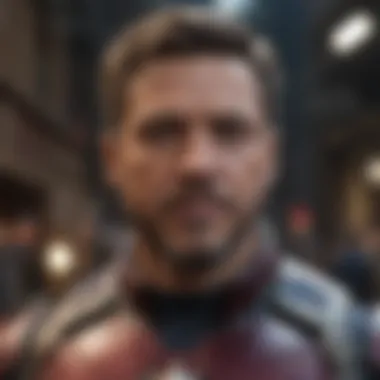Exploring the Evolution: Timeline of Avengers Movies


Overview of Avengers Movies
The Avengers movies represent a monumental franchise in the realm of superhero films. Beginning with the first Avengers film released in 2012, directed by Joss Whedon, it marked the inception of a cinematic universe that intertwined individual superhero stories into a cohesive whole. Each installment brought a unique blend of action, drama, and character depth that captivated audiences worldwide.
PlotStoryline Analysis
The plot of the Avengers movies revolves around a diverse group of superheroes coming together to combat various threats to humanity. From battling Loki in the first film to facing the formidable Thanos in later installments, each movie weaves a rich tapestry of interconnecting storylines while delving into the personal struggles and triumphs of the characters.
Character Development
One of the most compelling aspects of the Avengers movies is the nuanced development of its characters. Iron Man, Captain America, Thor, Hulk, Black Widow, and Hawkeye undergo significant growth throughout the series, grappling with their identities, responsibilities, and relationships. Each hero's journey adds layers of complexity to the overarching narrative, making the ensemble cast dynamic and multifaceted.
Visuals and Effects
Visually, the Avengers movies set a new standard for superhero films, incorporating cutting-edge special effects and stunning cinematography. The seamless integration of CGI with practical elements enhances the epic scale of the battles and the otherworldly realms visited by the characters. From the iconic fight scenes to the breathtaking landscapes, the visual prowess of the films immerses viewers in a visually striking and immersive cinematic experience.
Phase One: Avengers Assemble
In this segment of the article, we delve into Phase One: Avengers Assemble, a crucial milestone in the cinematic timeline of the Avengers movies. Phase One laid the foundation for the interconnected universe of superheroes that Marvel Studios meticulously crafted over the years. Each movie in this phase played a vital role in introducing key characters and setting the stage for the epic ensemble that would follow. The significance of Phase One: Avengers Assemble cannot be overstated, as it marks the beginning of an unprecedented cinematic experiment that would revolutionize the superhero genre.
Iron Man ()
Iron Man, directed by Jon Favreau and starring Robert Downey Jr. in the iconic role of Tony Stark, served as the inaugural film in the Marvel Cinematic Universe (MCU). The movie not only rejuvenated Downey Jr.'s career but also set a high standard for superhero films to come. It introduced audiences to the charismatic billionaire industrialist Tony Stark and his transformation into the armored superhero Iron Man. With its blend of wit, action, and technology, Iron Man quickly became a fan favorite and paved the way for the interconnected universe Marvel would later expand upon.
The Incredible Hulk ()
Directed by Louis Leterrier, The Incredible Hulk depicted the story of Bruce Banner, played by Edward Norton, and his struggles with the gamma-radiation-induced alter ego, the Hulk. While not as critically acclaimed as some of the other movies in Phase One, The Incredible Hulk contributed to the exploration of Marvel's gamma-irradiated hero. It set the stage for future developments in the character's arc and added depth to the expanding MCU.
Iron Man ()
Iron Man 2, the sequel to the original film, continued to follow Tony Stark's journey as Iron Man while introducing new challenges and adversaries. Directed by Jon Favreau, the film expanded upon Tony Stark's character development and his struggle to balance life as a billionaire inventor and a superhero. The introduction of new characters and the evolving dynamics within the MCU universe made Iron Man 2 a pivotal installment in Phase One, setting the stage for the overarching narrative of the Avengers.


Thor ()
Directed by Kenneth Branagh, Thor explored the mythological world of Asgard and the titular character's journey of redemption and growth. Starring Chris Hemsworth as Thor, the film blended sci-fi and fantasy elements to bring the Norse god to life on the big screen. Thor's introduction in Phase One enriched the diversity of characters in the MCU, setting the stage for his continued involvement in future Avengers films.
Captain America: The First Avenger ()
Captain America: The First Avenger, directed by Joe Johnston, delved into the origin story of Steve Rogers, played by Chris Evans, and his transformation into the super-soldier Captain America. The film's World War II setting provided a unique backdrop for exploring themes of heroism, sacrifice, and patriotism. As a key installment in Phase One, Captain America: The First Avenger laid the groundwork for Captain America's pivotal role in the Avengers team.
The Avengers ()
As the culminating film of Phase One, The Avengers, directed by Joss Whedon, brought together the ensemble of superheroes introduced in the earlier solo films. Iron Man, Captain America, Thor, Hulk, Black Widow, and Hawkeye united against the threat of Loki, marking a transformative moment in superhero cinema. The Avengers not only showcased the power of teamwork and camaraderie but also set the stage for the interconnected storytelling that would define the future phases of the MCU.
Phase Two: Rise of Ultron
Avengers movies usher in a new era with Phase Two: Rise of Ultron. This pivotal phase drives the narrative forward, delving deeper into the complexities of the Marvel Cinematic Universe (MCU). Phase Two sets the stage for greater conflicts and introduces audiences to the relentless force known as Ultron. As the stakes escalate, our beloved heroes must confront not only external threats but also their inner demons, paving the way for intense character development and intricate plot twists.
Iron Man ()
Iron Man 3 marks a turning point in Tony Stark's arc, exploring his vulnerability and resilience in the aftermath of the Battle of New York. As he grapples with PTSD and faces a formidable new enemy in the Mandarin, Stark must rely on his ingenuity and ironclad will to emerge victorious. The film showcases a darker side of Iron Man while reinforcing his status as a flawed yet undeniably heroic figure.
Thor: The Dark World ()
Thor: The Dark World delves into the cosmic realms of the MCU, expanding the mythology surrounding Asgard and the Nine Realms. As Thor battles to save both Jane Foster and his homeland from a formidable threat, the film intricately weaves together themes of sacrifice, duty, and the enduring power of love. With stunning visual effects and epic confrontations, Thor's journey in this installment challenges his mettle as a god and a protector.
Captain America: The Winter Soldier ()
Captain America: The Winter Soldier shakes the very foundation of S.H.I.E.L.D. as Steve Rogers uncovers a Hydra infiltration within the agency. Fueled by palpable distrust and political intrigue, this installment introduces the enigmatic Winter Soldier as Cap's personal nemesis. The film's espionage thriller elements, coupled with explosive action sequences, redefine the superhero genre and highlight the unwavering integrity of Captain America.
Guardians of the Galaxy ()
Guardians of the Galaxy ventures into uncharted territory, introducing a ragtag group of misfits who must band together to save the galaxy. Led by Peter Quill aka Star-Lord, this spacefaring adventure blends humor, heart, and breathtaking visuals to create a unique corner of the MCU. As the Guardians face off against cosmic villains, they form unlikely bonds and discover the true meaning of family, epitomizing the spirit of resilience in the face of overwhelming odds.
Avengers: Age of Ultron ()


Avengers: Age of Ultron heralds the rise of an AI-driven threat in the form of Ultron, a relentless force intent on achieving global peace through catastrophic means. As the Avengers grapple with internal conflicts and external threats, their unity is tested like never before. The film delves into themes of creation, destruction, and redemption, paving the way for profound consequences that reverberate throughout the MCU. With high-stakes battles and poignant character arcs, Age of Ultron reshapes the landscape of the Avengers saga, setting the stage for even greater challenges ahead.
Phase Three: Infinity Saga
Phase Three intertwines various superheroes' arcs, leading to the grand showdown with Thanos, the overarching villain. The storytelling in Phase Three delves deeper into the emotional and psychological struggles of the characters, providing a more nuanced exploration of heroism and sacrifice. Fans witnessed the culmination of years of build-up through incredible battles and unexpected plot twists, making Phase Three a crucial juncture in the Avengers saga.
Captain America: Civil War ()
Captain America: Civil War epitomizes the complexity and moral dilemmas faced by the Avengers as rifts emerge within the team. The film introduces audiences to the Sokovia Accords, which pit Iron Man against Captain America in a clash of ideologies. It serves as a stepping stone towards the eventual fracture of the Avengers, setting the stage for future conflicts and character dynamics. The inclusion of new heroes like Black Panther and Spider-Man adds layers to the narrative, showcasing the expanding roster of the MCU.
Doctor Strange ()
Doctor Strange introduces mystical elements into the Avengers universe, broadening the scope of superhuman abilities. The film follows the journey of Dr. Stephen Strange as he transitions from a skilled surgeon to the Sorcerer Supreme. Through intricate visual effects and mind-bending sequences, audiences are introduced to the concept of alternate dimensions and magic. Doctor Strange's inclusion in Phase Three foreshadows the impending multidimensional threats that the Avengers will face, setting the stage for deeper explorations of reality and existence.
Guardians of the Galaxy Vol. ()
Guardians of the Galaxy Vol. 2 delves into the personal journeys of the eclectic group of intergalactic misfits. The film delves into themes of family, identity, and redemption, unraveling the backstories of characters like Star-Lord and Gamora. With its vibrant visuals and eclectic soundtrack, Guardians of the Galaxy Vol. 2 offers a refreshing take on the superhero genre, blending humor with emotional depth. The movie expands the cosmic side of the MCU, enriching the universe with new worlds, species, and cosmic entities.
Spider-Man: Homecoming ()
Spider-Man: Homecoming brings everyone's favorite neighborhood hero into the Avengers fold, showcasing Peter Parker's struggles with balancing his high school life and superhero responsibilities. The film portrays a more grounded and relatable version of Spider-Man, emphasizing his youth and inexperience. By integrating Spider-Man into the larger MCU, Homecoming creates connectivity between various superhero arcs, hinting at the collaborative nature of future Avengers battles.
Thor: Ragnarok ()
Thor: Ragnarok revitalizes the character of Thor with a fresh, comedic tone and vibrant aesthetics. The film explores Thor's internal conflicts and his journey towards embracing his heritage and true power. By infusing humor and dynamic visuals, Ragnarok infuses new life into the Thor storyline, setting the stage for his crucial role in upcoming Avengers conflicts. The movie also introduces audiences to fan-favorite characters like Valkyrie and Korg, expanding the ensemble of diverse personalities in the MCU.
Black Panther ()
Black Panther transcends the superhero genre by delving into themes of identity, heritage, and social responsibility. The film showcases the technologically advanced nation of Wakanda and the titular hero's struggle to protect his people and legacy. Black Panther's success as a cultural phenomenon solidifies its importance within the Marvel universe, emphasizing the impact of diverse representation in mainstream media. The movie paves the way for deeper explorations of society and politics within the superhero narrative.
Avengers: Infinity War ()


Avengers: Infinity War culminates the Infinity Saga with a monumental clash against the Mad Titan, Thanos. The film weaves together multiple plotlines and character arcs, culminating in a devastating climax that alters the MCU forever. By showcasing the Avengers' vulnerability and the magnitude of Thanos' threat, Infinity War delivers a gut-wrenching narrative that challenges the very core of heroism. The film's shocking conclusion leaves audiences in disbelief, setting the stage for the epic conclusion in the following installments.
Ant-Man and The Wasp ()
Ant-Man and The Wasp offers a light-hearted reprieve amidst the dark tones of Phase Three, focusing on the dynamics between Scott Lang and Hope van Dyne as they navigate the quantum realm. The film explores themes of partnership, resilience, and redemption, blending humor with action-packed sequences. Ant-Man and The Wasp's inclusion in Phase Three provides a breath of fresh air, showcasing the range and diversity of storytelling within the MCU.
Captain Marvel ()
Captain Marvel introduces audiences to the powerful Carol Danvers, a key player in reshaping the cosmic landscape of the MCU. The film dives into Carol's origins as she uncovers her identity and battles a galactic threat. By portraying a female superhero in a leading role, Captain Marvel challenges traditional gender roles within the superhero genre, paving the way for greater representation and diversity. The inclusion of Captain Marvel in Phase Three sets the stage for her future interactions with the Avengers and cosmic entities.
Avengers: Endgame ()
Avengers: Endgame serves as the epic conclusion to the Avengers saga, wrapping up years of storytelling in a satisfying and emotional finale. The film revisits past moments in the MCU, offering nostalgic nods to long-time fans while delivering closure to character arcs. Endgame's focus on themes of sacrifice, redemption, and legacy resonates deeply with audiences, providing a poignant send-off to beloved characters. The movie sets a new standard for cinematic universes, showcasing the power of storytelling and character development on a grand scale.
Phase Four: Multiverse Saga
Black Widow ()
Black Widow (2021) takes a closer look at Natasha Romanoff's past and untold stories, serving as a belated tribute to Scarlett Johansson's iconic portrayal of the character. Set between the events of Captain America: Civil War and Avengers: Infinity War, this film delves into Natasha's origins, family dynamics, and the mysterious Red Room. The movie provides insight into Natasha's inner struggles, vulnerabilities, and the sacrifices she made during her heroic journey. With intense action sequences, emotional depth, and a poignant farewell to a beloved Avenger, Black Widow solidifies Natasha's legacy in the MCU.
Shang-Chi and the Legend of the Ten Rings ()
Shang-Chi and the Legend of the Ten Rings (2021) introduces a new superhero into the MCU, showcasing Asian representation and martial arts prowess on a grand scale. The film follows Shang-Chi's journey to confront his past, his connection to the Ten Rings organization, and the looming threat it poses to the world. With stunning fight choreography, rich mythology, and a fresh perspective on heroism, Shang-Chi expands the diversity and depth of the Avengers roster. The movie's success marks a significant step towards inclusivity and global storytelling within the Marvel universe.
Eternals ()
Eternals (2021) ventures into cosmic realms and ancient civilizations, exploring the origins and purpose of a powerful immortal race tasked with protecting Earth. The film delves into deep philosophical questions, existential dilemmas, and the consequences of immortal beings intervening in human affairs. With a star-studded ensemble cast, breathtaking visual effects, and epic scale storytelling, Eternals challenges the boundaries of traditional superhero narratives. The introduction of the Eternals adds a new layer of complexity and intrigue to the Avengers universe, setting the stage for cosmic adventures and moral dilemmas.
Spider-Man: No Way Home ()
Spider-Man: No Way Home (2021) breaks new ground in the superhero genre, showcasing the concept of multiverse crossovers and the repercussions of tampering with reality. The film dives into Peter Parker's struggle to navigate multiple dimensions, face familiar and unexpected foes, and grapple with the consequences of his actions. With nostalgia-inducing references, surprising twists, and emotional character arcs, Spider-Man: No Way Home ties together past Spider-Man franchises while setting the stage for future storytelling possibilities. The movie's impact reverberates beyond the Spider-Man narrative, affecting the very fate of the MCU.
Doctor Strange in the Multiverse of Madness ()
Doctor Strange in the Multiverse of Madness (2022) delves into the mystical realms of the Marvel universe, unraveling the dangers of manipulating reality and the unforeseen consequences that follow. As Doctor Strange faces off against supernatural threats and explores alternate dimensions, the film delves into dark magic, cosmic entities, and the fragile balance of the multiverse. With innovative visual effects, intricate world-building, and interconnected storytelling, Doctor Strange in the Multiverse of Madness promises a kaleidoscopic journey through madness and mystery, setting the stage for upheavals within the MCU.
Thor: Love and Thunder ()
Thor: Love and Thunder (2022) embraces thunderous action, Norse mythology, and the facetious charm of the God of Thunder, Thor. The film follows Thor and Jane Foster as they navigate personal struggles, cosmic threats, and the legacy of Asgard. With a blend of humor, heart, and over-the-top spectacle, Thor: Love and Thunder further explores the dynamics of power, heroism, and the enduring bonds of chosen family. The movie promises epic battles, emotional resolutions, and a fresh take on the superhero genre, solidifying Thor's place as a fan-favorite Avenger within the ever-expanding MCU.















